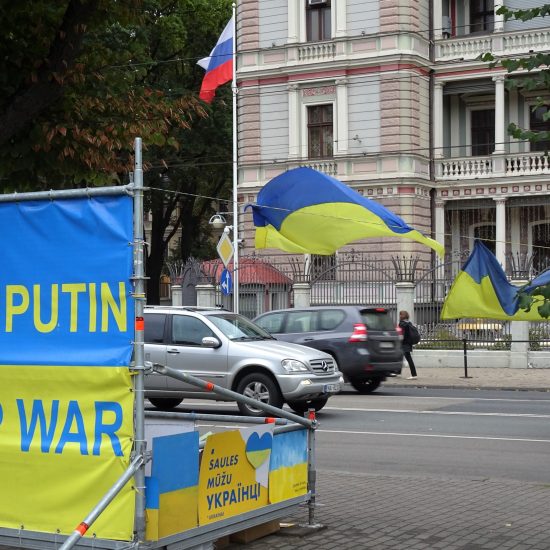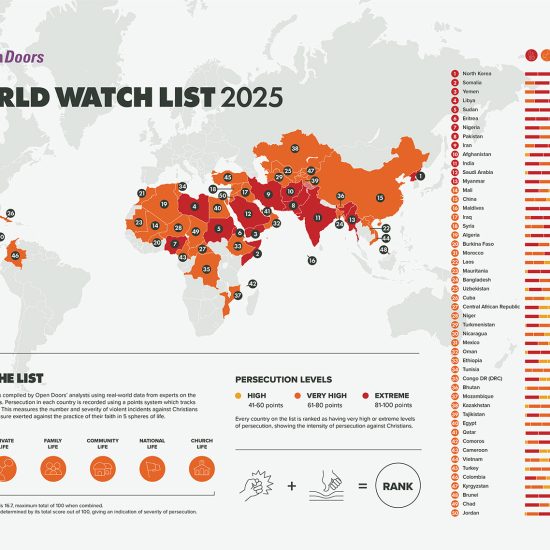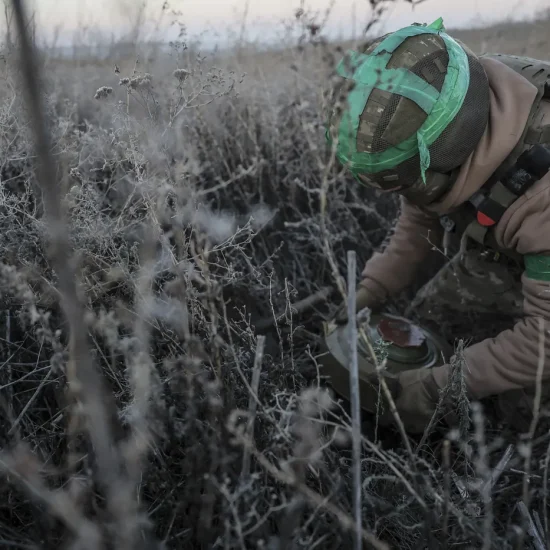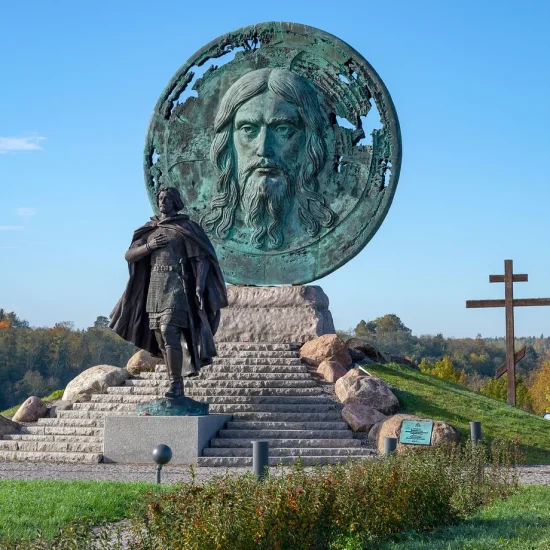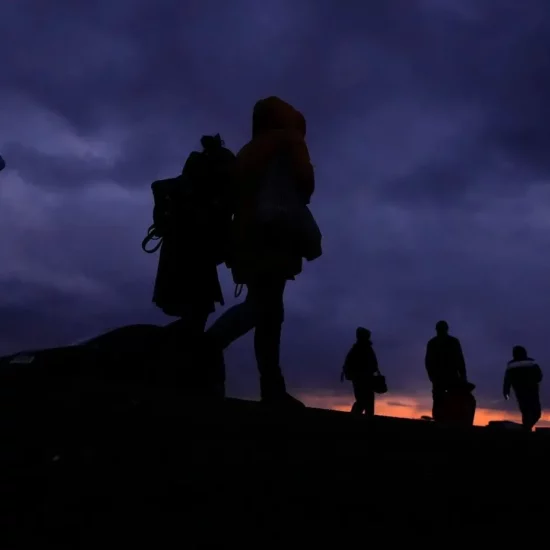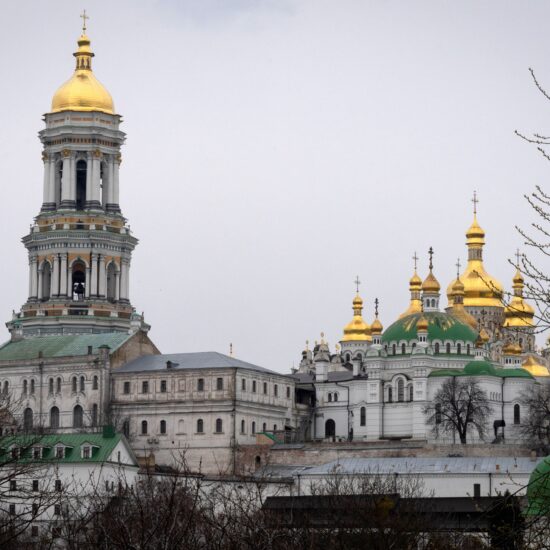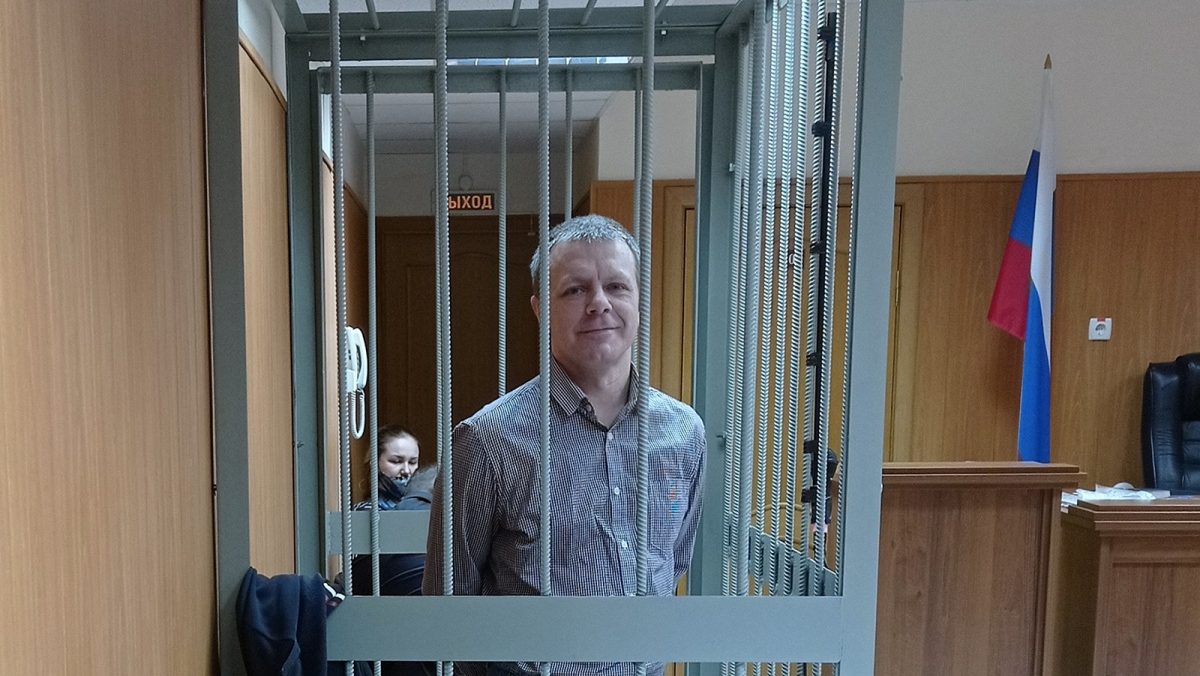
Last December, a homeless man set fire to a large Christmas tree outside the New York City headquarters of Fox News. Tucker Carlson took to the airwaves to denounce the arson as “a hate crime” against Christianity, which the Biden administration was ignoring “because they could care less.” A random crime by a person quickly arrested (and likely suffering from mental illness) somehow became evidence of Christian “persecution.”
Drawing attention to the persecution of Christians being ignored by U.S. leaders (primarily Democrats) because of supposed political correctness is one of the TV host’s regular themes. When hundreds were killed in Sri Lanka on Easter Sunday in 2019, Carlson chastised Barack Obama and Hillary Clinton for referring to the victims as “Easter worshipers.” He alleged this phrase was used because “our leaders believe Christians are the problem, that they are the dangerous ones.”
Sharing Carlson’s outrage about religious persecution, specifically of Christians, is Sen. Josh Hawley, a Republican from Missouri best known for his fist pump to the mob outside the U.S. Capitol on Jan. 6, 2021. He asked pointed questions about President Biden’s policy towards Nigeria, inquiring why the country was taken off the State Department’s list of religious freedom offenders and insinuating that diplomatic factors unrelated to religious freedom were at play.
More absurdly, Hawley called for greater scrutiny of Canada over worries about religious liberty protections related to churches and pastors facing government sanction for violating COVID-19 protocols. Canadian officials took actions not unlike those of officials in places like Florida and Louisiana.
“Frankly, I would expect this sort of religious crackdown in Communist China, not in a prominent Western nation like Canada,” the senator wrote. “Canadian authorities’ arrest of faith leaders and seizure of church property, among other enforcement actions, appear to constitute systematic, ongoing, and egregious violations of religious freedom.”
Despite their professions of concern about Christian persecution, what Carlson and Hawley have in common is publicly questioning U.S. policy towards Russia in its threats against Ukraine. Hawley has blocked key Defense Department appointees while also arguing the U.S. should acquiesce to a key Russian demand that Ukraine never be allowed to join NATO. This earned him a rebuke from White House press secretary Jen Psaki, who asserted Hawley was “parroting Russian talking points.” Carlson, with his own long record of supporting Russian positions, has made arguments similar to Hawley’s. The Russian state media responded with praise for both Hawley and Carlson.
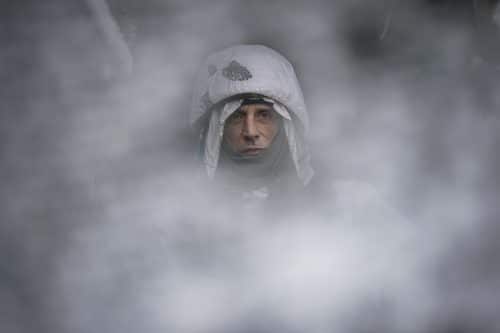
A Ukrainian serviceman, seen through a camouflage mesh, stands at a frontline position in eastern Ukraine on Jan. 29, 2022. (Vadim Ghirda/Associated Press)
What neither the senator nor the TV host bothers to address is Russia’s extensive track record of religious freedom violations. While eager to decry Christmas trees set aflame and enforcement of public health measures against churches north of the border, they minimize Russian aggression towards Ukraine and ignore its lengthy record of human rights abuses internally. Yet, the religious freedom abuses by Russian President Vladimir Putin’s regime remain far more egregious than anything done by a homeless man in New York or public health officials in Canada.
In this edition of A Public Witness, we highlight the spiritual, physical, and legal trials facing minority religious groups in both Russia and Russian-controlled parts of eastern Ukraine. We then urge politicians, pundits, and preachers to recognize the extent of the Russian threat as Putin’s troops amass on Ukraine’s borders.
Persecution in Russia
When Christians in the U.S. think of nations guilty of religious persecution, some places probably jump right to mind. Like China, North Korea, Myanmar, Iran, Pakistan, and Saudi Arabia. But the U.S. State Department’s top 10 list of countries guilty of “systematic, ongoing, egregious violations of religious freedom” also includes Russia. The U.S. particularly notes Russian persecution of Jehovah’s Witnesses, Muslims, Baptists, and Pentecostals.
The current problems in Russia really took off in 2016. That year, Putin signed a law targeting missionary and evangelistic activities. The law criminalizes sharing one’s faith outside an official house of worship. Local Christians are not always sure what activities could spark a complaint, especially since house churches are not always treated by officials as houses of worship. Local faith communities that operate unregistered — like Baptists and Seventh-day Adventists frequently do — are especially at risk. Missionaries from other countries are particularly restricted, even being fined for activities within a church.
Russian officials immediately started using the new law. An analysis by Forum 18, a group that tracks religious persecution globally, showed that officials used the law in the first year to bring 193 cases against 136 individuals and 57 religious communities. Those cases resulted in 143 convictions, 140 fines, and the deportations of five foreigners. Those targeted that year included 63 cases against Pentecostals, 43 against Jehovah’s Witnesses, and 31 against Baptists.
Exact data is often hard and slow to discover, but subsequent years reveal the persecution continues. For instance, the 159 prosecutions in 2018 included 50 Pentecostals and 39 Baptists, with a similar pace in 2019 and 2020. In 2020, officials brought the first prosecutions of Catholics and Methodists under the anti-evangelism law. While these minority groups in Russia are disproportionally targeted, the dominant church that’s aligned with Putin, the Russian Orthodox Church, has seen almost no members prosecuted despite their much larger numbers.
Additional governmental actions since 2016 have added to the religious liberty violations. In 2017, the Russian Supreme Court declared the Jehovah’s Witnesses an illegal “extremist” group, sparking prosecutions generally used against terrorists.
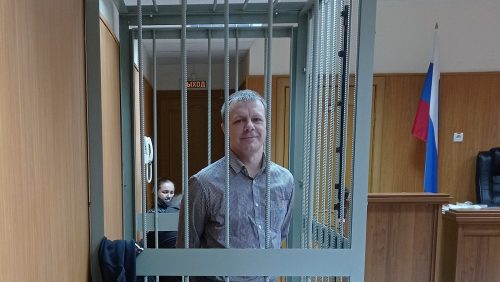
Yevgeniy Korotun, a Jehovah’s Witness who has been detained since July 2020, was last month given a seven-year prison sentence. (Jehovah’s Witnesses via RNS)
Additionally, Putin last year signed a new measure requiring extra training and recertification for any clergy, religious teachers, or missionaries who received their training in another country. Such clergy must take a course in “state-confessional relations in the Russian Federation” or risk being prosecuted under the unlawful missionary and evangelistic law of 2016. But since the government over the past four years revoked the licenses of Baptist, Lutheran, and Pentecostal seminaries, those clergy have no options to fulfill this requirement under Putin’s new laws unless they attend schools of other traditions (like the Russian Orthodox Church). A state official justified the new requirement as “aimed at protecting the spiritual sovereignty of Russia.” That’s essentially admitting a Christian Nationalism motivation, but one that’s so narrow that it also targets some Christians as not Christian or Russian enough.
All of this should trouble Christians elsewhere. Elijah Brown, general secretary of the Baptist World Alliance that includes unions of Baptists in Ukraine and Russia, has visited churches in both nations. In light of governmental targeting of believers — including efforts to shut down the Baptist seminary and a Christian campground — he told Word&Way that “the Baptist church in Russia is facing a really challenging moment.” He added that it’s important “to stand with them and to let them know that our Baptist family is praying with them and for them in the midst of all these challenges.”
Yet, while Putin targets evangelicals and other minority faiths, some U.S. Christian leaders cozy up to him. Franklin Graham has been praising Putin and Russia for years. He even initially planned to hold a “World Summit in Defense of Persecuted Christians” in Russia after Putin signed the anti-evangelism law. The Russians eventually suggested it be moved to Washington, D.C., where Graham presided over the 2017 event that featured Vice President Mike Pence and a top Russian Orthodox leader.
Graham previously praised Putin in an issue of Decision magazine (a publication of the Billy Graham Evangelistic Association) that featured Putin on the cover. In the piece, Graham attacked President Barack Obama and praised Putin, claiming “Russia’s standard is higher than our own.” More recently, Graham defended Putin from criticism by President Joe Biden.
Graham’s role is so important that Jack Jenkins of Religion News Service focused on him as evidence that some “American evangelicals have cultivated ties with Russia.” But while the son of the most famous Baptist evangelist praises an authoritarian ruler because of a shared agenda in fighting the LGBTQ community and Muslims, he provides moral support for a man and a regime persecuting Baptists and other Christians.
Help sustain the ministry of Word&Way by subscribing to A Public Witness!
Russian Persecution in Eastern Ukraine
Putin’s government is doing more than persecuting Christians and others in Russia. They’re also sending that persecution across the border to Ukraine in even more violent forms. As a November 2021 report by the United States Commission on International Religious Freedom explained, “Russia has exported its repressive religious regime to the neighboring country of Ukraine. ‘Authorities’ in Russian-occupied Crimea and the Russian-backed Donbas commit widespread religious freedom abuses, including false charges of Islamist terrorism to imprison Crimean Tatars.”
Back in 2014 (right after the Winter Olympics), Putin ordered an invasion of the Ukrainian region of Crimea. The U.S. and most of the international community, including the United Nations, have rejected the legality of the move and consider the territory as still belonging to Ukraine. Because the Russians currently exercise control over the region, the anti-evangelism laws have impacted Christians and others in Crimea.
On the heels of the illegal annexation of Crimea, Russian-backed separatists violently took control of the eastern Ukrainian regions of Donetsk and Luhansk. The conflict, which still flares up with sporadic violence, has resulted in the deaths of more than 13,000 people, including thousands of civilians. More than 2 million Ukrainians fled their homes and livelihoods in the region, some becoming internally displaced in western Ukraine and others as refugees to neighboring nations.
Elisey Pronin was a Baptist pastor in the Luhansk region when militants took over. Even as bombs destroyed much of his city, he continued to minister to those who had not been able or willing to flee even as water, electricity, and other services fell apart. Militants threatened to kill him, and they burned down his church because he refused to support the new government. He eventually left the region and now teaches at the Ukrainian Baptist Theological Seminary in Lviv (in the western part of the nation).
“Everything was destroyed in 2014 when the war came into our life,” Pronin told Word&Way during a visit to the United States.
“I don’t know what you’ve heard about war, what you know about war,” Pronin also said. “It’s not the same as what we used to see, to watch on TV. When we watch some show, it looks like it’s not so bad. It looks like some good guys shoot bad guys, and we think it’s war. In reality, not. War, it’s just terrible.”
Pronin wrote more about this experience in his book Chronicles of Undeclared War.
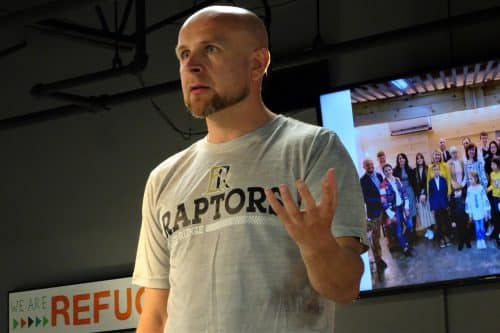
Elisey Pronin speaks about ministry and life in Ukraine at First Baptist Church in Jefferson City, Missouri, on June 10, 2021. (Brian Kaylor/Word&Way)
For Christians in smaller Protestant traditions who stayed in the Donetsk and Luhansk regions after the initial months of heavy fighting, the persecution soon reached levels they have called worse than what they experienced during the Soviet era. The leaders of the self-proclaimed republic in Luhansk passed new laws requiring churches to register with the officials and pledge support of the rebel government.
Baptists, however, were banned from registering because of the Ukrainian Baptist Union’s outspoken opposition to the occupation of the two regions. This meant all 43 Baptist churches in the region were illegal. Similar efforts have also impacted Baptists and others in the Donetsk region. Unregistered worship services lead to raids and fines. Church buildings have been seized and sealed up. Some pastors have remained, continuing to minister illegally.
Additionally, dozens of religious books have been declared “extremist” and banned in Luhansk. Among the materials put on the “State List of Extremist Materials” are a Baptist hymnal, books by Billy Graham and Charles Spurgeon, and the Gospel according to John (yes, the fourth Gospel is banned as “extremist”). The Ukrainian Baptist magazine Herald of Truth has also been banned and seized in raids on churches.
All of this occurs thanks to the military support Putin’s regime provides to the separatist leaders.
Get cutting-edge analysis and commentary like this in your inbox every week by subscribing today!
A Looming Threat
As bad as the situation currently is in Russia and the occupied parts of eastern Ukraine, it could soon get worse. U.S. and some European governments seem convinced Putin will start a Russian invasion of Ukraine. If war comes, the loss of human life would be horrific. And it would devastate the economy and infrastructure of Ukraine. Literally caught in the crossfire and bomb blasts would be churches and individual Christians.
Additionally, as we’ve seen in both Russia and the occupied parts of eastern Ukraine, any territory Russia takes by force would soon experience the targeting of religious minorities, including some Christian groups. Many would become homeless and probably flee westward as refugees. Those that stayed would find their freedom to worship greatly infringed upon.
“The church will go underground,” Yarsolav “Slavik” Pyzh, president of Ukrainian Baptist Theological Seminary in Lviv, recently predicted if a Russian occupation occurs. “You have to understand that historically we had that experience before under the Soviet Union.”
Some ministries might particularly face persecution, like those previously in Russia that moved their base of operations to Ukraine to avoid prosecution under Putin’s anti-evangelism law. For instance, a Russian FM radio station, New Life Radio, now operates out of Ukraine. As the first Christian FM station in Russia, their decades-long ministry of broadcasting Christian music, sermons, and Bible studies to people in Russia, Ukraine, and elsewhere is imperiled. Should a Russian invasion come, they plan to move again.
A diplomatic resolution to this geopolitical nightmare seems less likely by the day. There is little appetite for the U.S. or NATO coming to Ukraine’s aid militarily. All that remains is Putin deciding how far to push and for the Biden administration and European allies to determine the severity of a response likely to include sanctions, a repositioning of NATO forces, and indirect support to Ukrainian forces. The world will watch to see what resistance Ukraine’s military can offer.

Screengrab of Ukrainian athlete Vladyslav Heraskevych displaying a “No War in Ukraine” sign after racing in the men’s skeleton during the Beijing Olympics on Feb. 11, 2022.
What seems guaranteed in a forthcoming conflict is the loss of lives created in the image of God, unnecessary humanitarian suffering, and the infringement upon the right of people to believe and worship (or not) as their conscience guides. This is a time when political leaders need to be speaking up for human rights and democratic values, rather than providing cover to authoritarian regimes. Consider the witness of Sam Brownback, former President Donald Trump’s U.S. Ambassador for International Freedom. In 2020, he called on Russia “to release religious prisoners and political prisoners, including all Jehovah’s Witnesses persecuted on account of their faith.”
Politicians like Josh Hawley, pundits like Tucker Carlson, and preachers like Franklin Graham feign concern about religious persecution, but in bolstering Putin’s regime they fail to grasp the moral stakes of this moment. Indeed, Carlson once ranted about U.S. leaders who “consistently ignore the persecutions of Christians around the world,” adding that “when U.S. policy contributes to that persecution — and it does — they say nothing about it.”
He is guilty of the sin he accuses others of committing: pushing policies that provide support for the ongoing oppression of Christians. As Carlson, Hawley, and Graham praise and promote Putin, they aid and abet the religious persecution in Russia and eastern Ukraine.
Until they change their tune on Russia, Christians in the U.S. should tune them out.
As a public witness
Brian Kaylor & Beau Underwood

